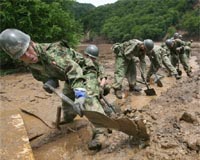| . |  |
. |
College Park, Md. (UPI) Mar 15, 2011 The toll in human misery wrought by the tsunami and earthquakes in Japan test the imagination of economists but the effects on Japan's gross domestic product and wealth are a different matter. GDP, which measures goods and services produced, will immediately dive in Japan and stay lower through the second and into the third quarters of 2011 but will then surge as construction and spending on capital equipment to rebuild drives up growth. Overall, however, Japan will be poorer, for this disaster. Lost infrastructure, factories and the like will be replaced but wealth is the sum of what citizens and governments own -- those include physical assets like those just noted and financial wealth, namely securities and cash. Rebuilding will run down Japan's financial wealth to replace lost physical assets. As estimates of the damage emerge, those totals are real deadweight losses to wealth. To the extent Japan must run down financial assets and bring home foreign investment to rebuild, the net wealth of Japan is permanently reduced. Generally, after three years or so, the impact on GDP is small -- production is lost in the first two quarters but more goods and services are produced in later quarters to rebuild. Often the net loss in GDP, from even the largest natural disasters, comes to no more than 1 percent of GDP in large advanced industrialized countries. Replacing lost production and rebuilding lifts output in a nation's geographic areas less affected by the disaster to provide the resources to rebuild and compensate for lost output in the most affected region. However, this time could be different. Japan has encountered two disasters -- the tsunami and earthquake, and the nuclear explosions -- and globalization may make Japan more vulnerable rather than in the past. The double whammy has the potential to keep the Japanese economy shut down longer and globalization offers Japan's export customers alternatives they might not have enjoyed a decade or two ago. Hyundai and Ford now are good substitutes for Toyota's cars and, even more so, Caterpillar tractors made in China can replace Komatsu's land movers. The pause and uncertainty effected by the nuclear shut down will cause production to rev up more outside Japan and take longer to return to full capacity inside the country. Longer term the nuclear disaster will accelerate the implosion of Japan's economy caused by an aging population, just as Hurricane Katrina caused people and activities to permanently leave more economically depressed areas of the Gulf Region permanently for faster growing places in the United States. Some of New Orleans' and Mississippi's lost capital will never be restored -- it went elsewhere in the United States. For Japan's disaster stricken economy that elsewhere may be other places around the world. For the global economy, the nuclear disaster in Japan will cause more delay in reducing dependence on oil from the politically volatile Middle East. Wind, solar and other alternatives hold great promise but nuclear still offers the safest, large-scale option around. The problem is the loss of life associated with nuclear failures gets concentrated, even if it is much smaller over time per Btu produced, at events like Fukushima. That latter will increase hesitation around the world about building nuclear plants and keep the global economy in the grip of oil longer. This time, the path to recovery will be tougher for Japan, and for the global economy, ripped by the Great Recession and high priced oil, the path of recovery will be inexorably altered. (Peter Morici is a professor at the Smith School of Business, University of Maryland School, and former chief economist at the U.S. International Trade Commission.) (United Press International's "Outside View" commentaries are written by outside contributors who specialize in a variety of important issues. The views expressed do not necessarily reflect those of United Press International. In the interests of creating an open forum, original submissions are invited.)
Share This Article With Planet Earth
Related Links Bringing Order To A World Of Disasters A world of storm and tempest When the Earth Quakes
 Japan to deploy 100,000 troops on quake aid
Japan to deploy 100,000 troops on quake aidTokyo (AFP) March 13, 2011 Japan will double to 100,000 the number of troops on rescue and relief missions after a massive earthquake and tsunami hit the northeast coast, the government said Sunday. Defence Minister Toshimi Kitazawa told a meeting of his ministry's emergency headquarters that he had received the order from Prime Minister Naoto Kan, a government official told AFP on condition of anonymity. Police ... read more |
|
| The content herein, unless otherwise known to be public domain, are Copyright 1995-2010 - SpaceDaily. AFP and UPI Wire Stories are copyright Agence France-Presse and United Press International. ESA Portal Reports are copyright European Space Agency. All NASA sourced material is public domain. Additional copyrights may apply in whole or part to other bona fide parties. Advertising does not imply endorsement,agreement or approval of any opinions, statements or information provided by SpaceDaily on any Web page published or hosted by SpaceDaily. Privacy Statement |